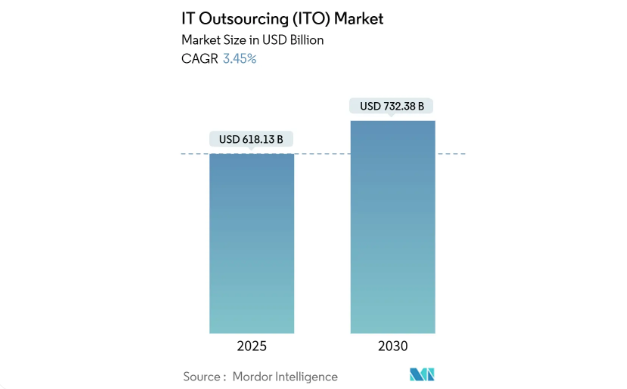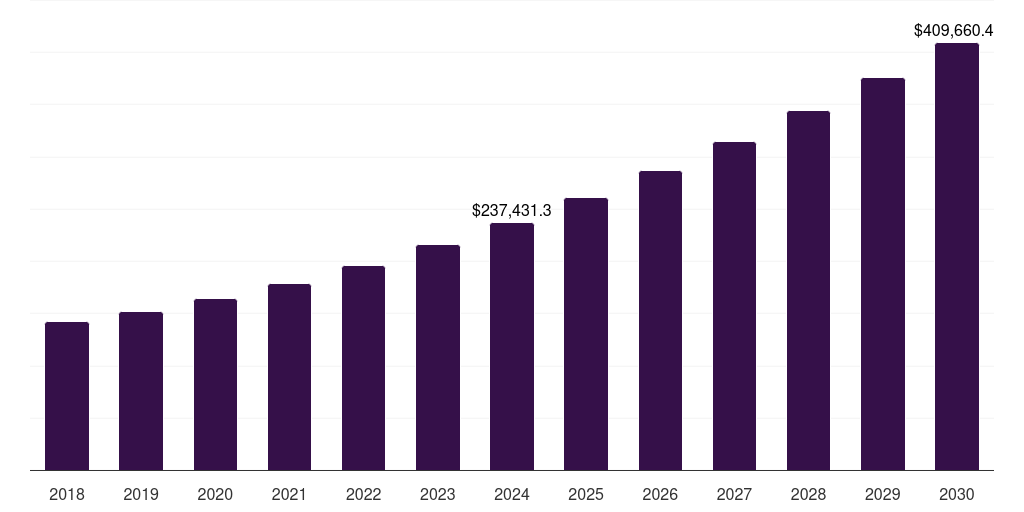Quick Summary :- Thinking of hiring a dedicated development team in 2025? Learn how this model works, its benefits, cost considerations, challenges, comparisons with other models, and step-by-step tips to choose and manage the right team effectively.
A dedicated development team is a collaboration model where skilled software professionals focus exclusively on your project. It helps companies achieve faster delivery, better quality and cost efficiency compared to managing a full in house team.

According to Mordor Intelligence (2025), the global IT outsourcing market is valued at USD 618.13 billion and is projected to reach USD 732.38 billion by 2030, growing at a 3.45% CAGR. This shows the rising preference for dedicated team models worldwide.
What Is a Dedicated Development Team?
A dedicated development team is a long-term outsourcing model where developers, designers and testers work as an extension of your company. They focus solely on your product, providing flexibility, scalability and specialized expertise without full in-house overhead.
The dedicated team model is particularly useful for startups building a minimum viable product, enterprises modernizing legacy systems, or businesses that lack certain technical expertise internally.
For example, a fintech startup might hire a custom software development company for secure payment integration, while a healthcare company could engage a team for building a HIPAA compliant patient portal.
💡 DID YOU KNOW?
Around 92% of G2000 companies rely on IT outsourcing, proving it’s a trusted strategy for scaling operations and accessing global expertise.
Structure and Roles in a Dedicated Development Team
The composition of a software development team depends on your project’s specific needs. Typically, a team may include:
- Front-end and back-end developers, full-stack engineers, and mobile developers to build and maintain applications.
- UI/UX designers to create user-friendly and visually appealing interfaces.
- DevOps engineers to handle deployment, infrastructure and continuous integration.
- Quality assurance specialists to ensure software is reliable, secure, and bug-free.
- Business analysts to translate business requirements into technical tasks.
- Product managers to define priorities, oversee feature development and align with business goals.
- Project managers to coordinate the team, track progress and manage communication between client and vendor.
Responsibilities are shared between client and vendor. The client defines vision and priorities, while the vendor handles technical delivery, team management and daily operations for smooth collaboration.
Dedicated Development Team vs Other Engagement Models
Choosing the right engagement model is key to project success. The table below compares dedicated teams, fixed-price, time & material, in-house, and staff augmentation.
| Engagement Model | Description | Best For | Pros | Cons |
| Dedicated Team | Full-time external team works exclusively on your project. | Long-term projects, evolving requirements | Flexibility, control, access to global talent | Requires management oversight |
| Fixed Price | Project delivered for a set cost and timeline. | Projects with clearly defined scope | Predictable budget, low financial risk | Limited flexibility, scope changes are costly |
| Time & Material | Pay for actual hours and resources used. | Projects with evolving requirements | Flexibility to adjust scope | Budget can fluctuate, requires monitoring |
| In-house Team | Internal employees handle all development tasks. | Core strategic projects | Full control, team integration | High cost, slower scaling |
| Staff Augmentation / Extended Team | Add external developers to existing teams temporarily. | Short-term skill gaps | Quick scalability, knowledge transfer | Less commitment, requires integration |

📈 Market Insight
The US software market is projected to hit $409.6 billion by 2030, growing at a strong 9.4% CAGR between 2025 and 2030.
When Should You Hire a Dedicated Development Team?
A dedicated development team is ideal for businesses that need long-term focus, specialized skills, and consistent delivery. Consider this model if your project involves:
- Long-term projects: Products requiring continuous development, maintenance and iterative improvements.
- Scaling product development: Rapidly growing applications that need additional developers without expanding in-house staff.
- Niche expertise: Technologies or domains your in house team lacks, such as Artificial Intelligence, blockchain development, or HIPAA compliant healthcare systems.
- Limited in-house capacity: When your internal team cannot handle the full scope of work, a dedicated team acts as a seamless extension of your organization.
Example: A B2B SaaS company developing an enterprise resource planning (ERP) platform may hire dedicated developers to build complex modules, integrate multiple systems and continuously improve features over the years.
When To Avoid Hiring a Dedicated Development Team
A dedicated team is not always the best choice. Avoid this model in cases such as:
- Short term projects: Tasks that can be completed quickly may not justify the commitment of a full-time team.
- Projects with unclear scope: If your requirements are still undefined, a fixed-price or time & material model is more flexible.
- Limited budget for one-time tasks: When resources are tight and the project is small, hiring freelancers or a fixed price contract may be more cost-effective.
💬 Community Insight
A Quora contributor noted that without a dedicated team, projects often face debugging challenges, missed deadlines, and lack of continuity due to constant team changes.
What Are the Key Benefits of Hiring a Dedicated Team?
Hiring a dedicated software team offers several advantages that make it an appealing choice for businesses building complex software or scaling products.
- Cost Efficiency: Hiring a dedicated team reduces overhead costs like recruitment, training and office space, while providing access to skilled offshore or nearshore talent at competitive rates.
- Faster Time to Market: A full-time team focused exclusively on your project accelerates product development cycles, enabling quicker feature releases, updates and product launches compared to intermittent or freelance arrangements.
- Access to Global Talent: Organizations can tap into a custom software development team with specialized skills, from Generative AI engineers to mobile developers, regardless of local talent limitations.
- Scalability & Flexibility: Dedicated teams can be scaled up or down based on evolving project requirements, allowing you to add specialists or adjust roles without disrupting ongoing development.
- Focus on Core Business: By outsourcing technical execution to a dedicated team, internal resources can concentrate on strategic priorities like product innovation, market growth and customer engagement.
In short, a dedicated software development team blends the focus of an in-house team with the flexibility of outsourcing, delivering expertise, scalability, and efficiency. According to Forbes, it also helps startups access global talent, reduce costs, and focus internal resources on strategic priorities.
What Are the Challenges of Hiring a Dedicated Team and How to Solve Them?
Working with a dedicated development team brings many advantages, but it also comes with a few challenges. Here are the top five challenges and practical ways to overcome them:
Communication Gaps
Remote teams can sometimes miss updates or misunderstand requirements. Use tools like Slack or Microsoft Teams for daily communication, hold regular stand-ups, and share clear progress reports.
Example: A SaaS company building a CRM platform scheduled daily 15-minute check-ins to ensure the offshore team stayed aligned with the product roadmap.
Also Read: Tired of Communication Gaps? Offshore AI Software Teams That Actually Collaborate
Cultural Differences
Time zones, work habits, and language differences may affect collaboration. Overlapping working hours and team-building activities help bridge gaps.
Example: An e-learning startup had weekly cross-team video calls to sync their in-house and dedicated teams, improving understanding and efficiency.
Onboarding New Team Members
Adding developers mid-project can slow progress if onboarding is unclear. Prepare detailed documentation, assign mentors, and use structured handoffs.
Example: A fintech company onboarded new QA engineers by pairing them with senior developers for two weeks, speeding up integration.
Also Read: Remote Work Challenges And Its Potential Solutions
Security and Data Protection
Sharing sensitive data externally carries risk. Implement NDAs, encrypted communication, and secure development environments.
Example: A healthcare company building a patient portal ensured all data transfers were encrypted and compliant with HIPAA regulations.
Ensuring Commitment and Accountability
External teams may feel less connected to your goals. Set clear KPIs, hold regular review meetings, and involve the team in decisions.
Example: A B2B SaaS company shared product metrics and roadmap updates weekly, helping the dedicated team feel ownership over outcomes.
By addressing these challenges proactively, businesses can maximize the benefits of a dedicated development team, ensuring smooth collaboration, high-quality delivery, and long-term project success.
How Much Does a Dedicated Team Cost in 2025?
A dedicated IT team gives you flexibility and expertise but costs can vary greatly. Knowing these variables will help you budget and choose the right team for your project.
Regional Cost Comparisons
Knowing regional pricing will help you make better decisions:
- Eastern Europe: $25 – $85 / hr
- Latin America: $25 – $85 / hr
- USA: $80 – $150 / hr
- Asia: $12 – $80 / hr
For example, in India, typical rates are under $25 / hr.
🌍 Global Digital Hubs
India consistently ranks among the top five global digital hubs, alongside the US, UK, China, and France, showing its strength in outsourcing and innovation.
Estimated Monthly Cost Ranges
Monthly costs vary by team size and project scope.
| Team Size | Monthly Cost Range (USD) | Best For |
| Small (3 – 5 members) | $5,000 – $25,000 | Startups or MVPs |
| Mid Sized (6 – 10) | $20,000 – $50,000 | Growing products or medium scale apps |
| Large (10+) | $50,000+ | Enterprise level or complex solutions |
Cost Factors
Several factors influence the cost of hiring a dedicated team:
- Team Size: Larger teams need more resources and management
- Experience Level: Senior developers charge more for their expertise
- Project Complexity: Advanced features or integrations increase project costs
- Location: Rates can differ widely based on the team’s location
How to Hire the Right Dedicated Development Team?
As highlighted by Forbes, building a strong development team is like assembling a sports team: every member must clearly understand their role, responsibilities, and contribution to achieving project goals.
Hiring a dedicated development team requires careful planning and evaluation to ensure your project runs smoothly and meets quality expectations. Follow this step-by-step process:
Step 1. Define Project Requirements & Scope
Clearly outline your project’s objectives, technical needs, deliverables and timelines. A well-defined scope helps identify the skills required and prevents misunderstandings later.
Step 2. Research & Shortlist Vendors
Explore software development companies, check their portfolios and gather recommendations. Focus on vendors with experience in projects similar to yours.
Step 3. Review Expertise, Portfolios, and Testimonials
Examine case studies, client reviews, and team skills to gauge the vendor’s capabilities and reliability. Look for evidence of successful project delivery and technical depth.
Step 4. Conduct Scope Call & Team Interviews
Engage shortlisted vendors in detailed discussions. Interview key team members to assess their technical expertise, communication skills and understanding of your project.
Step 5. Finalize Proposal & Contracts
Review the vendor’s proposal carefully. Ensure all terms, timelines, costs and responsibilities are properly documented. Include legal safeguards, NDAs and service level agreements where necessary.
Step 6. Start with Clear Roles & Communication Plan
Set expectations, assign responsibilities and establish collaboration tools and reporting routines. Regular updates and defined communication channels ensure smooth coordination throughout the project.
Step 7. Red Flags to Watch Out For
Avoid vendors who lack transparency, provide unrealistic promises, fail to showcase past work or show inconsistent communication. These can indicate potential issues and impact project success.
🎓 Expert Quote
“Do what you do best, and outsource the rest.” – Peter Drucker, Management Consultant, Educator and Author
Real-World Examples: Companies Benefiting from a Dedicated Development Team
Many leading companies use outsourcing to accelerate growth, access specialized talent, reduce costs and focus internal resources on core business priorities.
Google outsources non-core functions like IT management and software development to firms such as Cognizant, optimizing costs, leveraging external expertise, and allowing internal teams to focus on core business priorities.
WhatsApp outsourced major early iOS development to Igor S, who built the first iOS version remotely. This outsourcing enabled rapid growth and supported global feature expansion from the very beginning
Alibaba
Alibaba outsourced its initial website development, logistics, and HR functions, enabling Jack Ma to focus on eCommerce. This strategy helped Alibaba scale rapidly and build a solid growth foundation
GitHub
GitHub initially outsourced key backend development to Scott Chacon, a consultant with rare Git expertise. His contributions, including building the Gist feature, were pivotal to GitHub’s early success.
Why eSparkBiz Is the Right Choice for Dedicated Development Teams?
Partner with eSparkBiz for secure, skilled and reliable dedicated development teams that ensure quality and long-term success.
- 15+ years of software development expertise
- 100% NDA protected contracts for data security
- 95% client retention rate demonstrating satisfaction
- Dedicated Team of 400+ Skilled Developers
- Access to 45+ cutting edge technologies
- Ideal for ongoing or complex projects
- Clear communication and regular project updates
Conclusion
Partnering with a dedicated development team empowers businesses to access specialized skills, maintain consistent quality, and adapt quickly to evolving project needs. It bridges the gap between in house focus and global expertise efficiently.
Success depends on thoughtful team selection, clear communication and well-defined roles. When aligned with your vision, a dedicated team not only accelerates development but also becomes a reliable team extension of your business, driving innovation and long-term growth.
Looking for a Dedicated Development Team?
Hire skilled developers at eSparkBiz to accelerate product delivery and scale efficiently.





